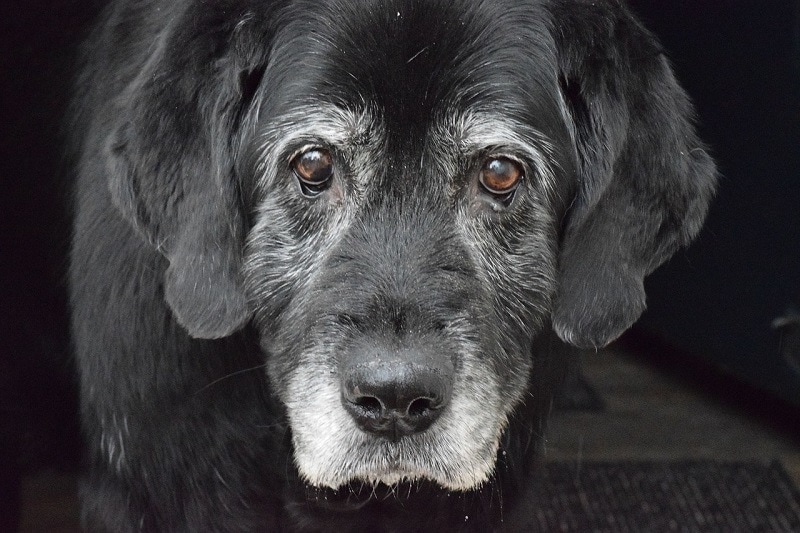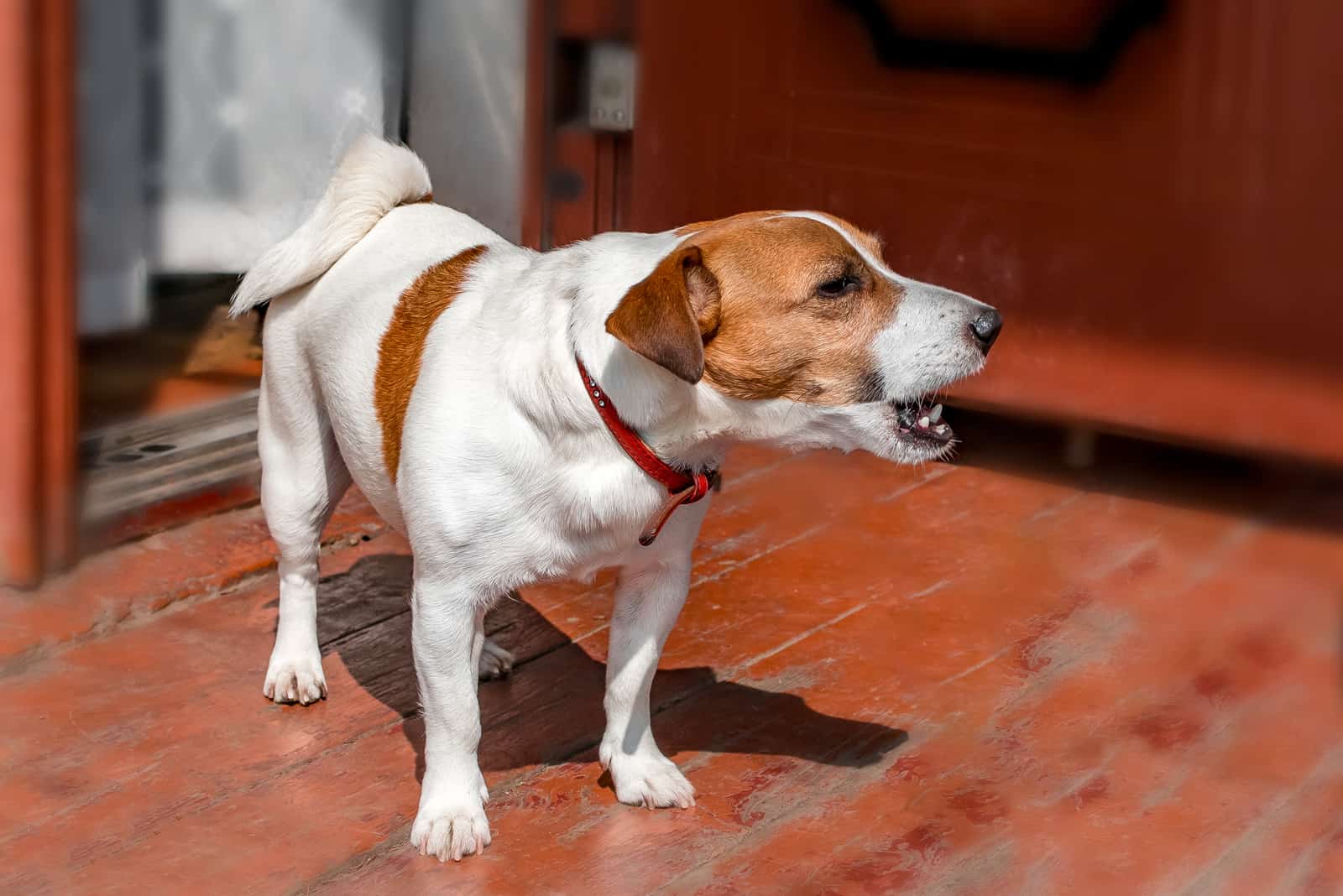Negative Experiences Tied to a Room
Rooms like the bathroom and laundry room can be unpleasant for your dog, and they might avoid those rooms or be wary of going in or near them. They might be reminded of bath time when they’re in the bathroom, an experience most dogs do not enjoy.
Similarly, the laundry room is full of loud noises and mysterious machines, so most dogs won’t relax and let their guard down there.
Another possibility is a one-off experience you may not even be aware of. We had a dog get frightened by a coat falling off the rack in the hallway, and it took us weeks to realize the source of his newfound fear when it happened again.
Sometimes you might never figure out what spooked your buddy. As long as the fear subsides with time, there probably isn’t anything to worry about.
Older dogs are more prone to age-related maladies, and sometimes unexplained fear can be a sign of cognitive decline. Unfortunately, our canine companions are not immune to brain diseases like dementia. Some dogs experience confusion or auditory and visual hallucinations that can be intense, frightening experiences for them.
If you suspect your older dog is experiencing age-related cognitive disorders, contact your vet. They will conduct a thorough examination and help devise a plan to help you make your older dog’s latter years comfortable and happy.

Without any apparent outward stimuli causing your dog’s strange, scared behavior, it could be a symptom of underlying illness. Many possible conditions could present as fear.
Aging dogs are more susceptible to vestibular disease, but all dogs can develop it regardless of age. Vestibular disease is a catch-all term for ailments affecting the body’s vestibular system. There are many facets to vestibular disease, but one rare symptom involves auditory hallucinations, which can be extremely frightening experiences.
The bottom line is any unexplained fear that doesn’t seem to have any cause needs to be taken seriously. If you think there is a chance your dog’s scared behavior could be due to illness, contact your vet immediately and schedule an appointment.
Dog Suddenly Scared Of Something In House: Why?

I’m sure you have visited a new place with your dog or met new people many times. In such situations, intense barking or even attempted attacks by your dog are common. While some dogs become aggressive, others show extreme fear when placed in new situations.
A dog’s behavior changing when he is in unfamiliar surroundings will probably not surprise you, but it’s a very different story if you notice an intense and sudden fear in your dog in his own home.
This situation would worry you a lot: what could your dog be afraid of inside his own house? Why is your dog acting weird all of a sudden?
The house should be his safe place! He loves all the family members, he knows every corner of the house by heart, and he loves to take a nap in lots of places he really shouldn’t (you can’t resist your cute puppy and in the end you still allow him to!).
So, why is your dog suddenly scared of something in house?
9 Common Reasons Why Is My Dog Afraid Of The House
If you can’t figure out for yourself why your dog is suddenly skittish, take a look at our list of common things that can cause fear in your dog.
Try to test if any of the things on the list are a possible reason for the sudden fear in your pet.
This Dog is Afraid of Everything! – Solid K9 Training (2021)
If your dogs personality goes from confident to fearful in certain parts of the house, he has probably developed a negative association with some aspect of the room. You can help your dog deal with his fear once you figure out what exactly is causing his sudden behavioral shifts.
Many canine phobias are related to prior traumatic experiences and reinforced negative associations. For example, being cooped up in an animal shelter for months may make something as benign as the smell of certain disinfectants intolerable for your pet because it reminds him of the long, unpleasant ordeal. Whatever the cause, fear develops when your pup connects a certain room to unpleasant sensations, memories or negative feelings, like isolation or competition. A room may be too hot or too cold for your pup most of the time, so he knows that going in there will be uncomfortable. Some dogs are just afraid of new things. Phobias arent always the result of prior experience. If your dog seems to be afraid of a lot of things, consult a behavioral therapist to discuss remedial training and acclimation strategies.
When your dog steps onto certain hard flooring, its possible that all the terrible memories of vet office visits are flooding back into his brain. As strange as it may seem, the appearance or texture of the flooring in a particular room can terrify your pup, according to the Merck Manual for Veterinary Professionals. Develop a positive association with the room with treats and encouraging words. Start slowly by beckoning your dog to cross only a small portion of the room to reach the reward. Increase the distance until hes comfortable traversing the entire area.
You may not be able to smell the difference between one room and another, but your dog can. Certain smells, like potent perfume or air freshener, can be offensive to your pets senses. Remove candles and other scents from the room and see how your dog reacts. Consult a behavioral therapist if your dog is afraid of the sight and smell of other people. Consider having the room tested for mold and other unseen sources of odor. Dogs are able to smell mold spores even when humans cant. In fact, some mold detection companies rely on dogs to find unwanted fungal growth inside houses. The scent of an animal, either dead or alive, inside the wall may also be bothering your pup.
Washing machines, hair dryers and high-pitched sounds are not very pleasant for your pup. Listening to these sounds may cause physical pain or arouse negative memories. Remember, dogs can hear at much higher frequencies than humans. Even if you hear nothing, unplug all of the electronic devices in the room and turn off the lights. Bring your dog into the room and see how he reacts with all of the sound sources disabled. More than a third of pups with noise phobias also suffer from separation anxiety, according to the American Kennel Club Canine Health Foundation.
Your dogs phobia may not have anything to do with the room itself. If the dreaded vacuum cleaner or another offensive object dwells in the area, it might be enough for him to loathe the entire room. If your dog becomes fearful or aggressive when you handle a certain stuffed animal or the fly-swatter, remove the undesirable object from the room and bring him back into the area.
Quentin Coleman has written for various publications, including All Pet News and Safe to Work Australia. He spent more tan 10 years nursing kittens, treating sick animals and domesticating semi-feral cats for a local animal shelter. He graduated from the University of Delaware with a bachelors degree in journalism.